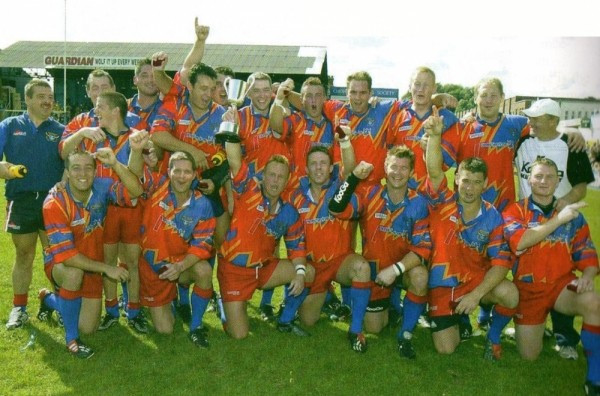
By Ian Golden.
The twentieth season of the WRL South Wales men's competition kicks off next month as holders Rhondda Outlaws attempt to defend their crown.
Over 500 games in the competition, which started out being part of the Britain-wide Rugby League Conference in 2003, have taken place.
Bridgend Blue Bulls have won 10 of the Grand Finals staged and it all started on their then ground at Coychurch Road, the former home of Bridgend Blue Dragons (now an Asda), where a meeting chaired by Niel Wood, Danny Sheehy and Mike Nicholas, set things in motion.
Six teams competed in that first season as Bridgend were joined by Aberavon Fighting Irish, Cynon Valley Cougars (who later dropped Cynon from their name), Rumney Rhinos, Swansea Bulls and Torfaen Tigers.
Cardiff Demons, who had been around since 1997, elected to stay in the South West England Conference for that first season to let the other clubs settle in, but when they faced Bridgend (a piece on this match shown on Sky Sports' Boots n All), then Aberavon in the national play-offs, they were beaten in both games. They transferred to the Welsh set-up in 2004.
What has now gone down as the first Welsh Grand Final in 2003 wasn't originally marketed as such, it was merely a South Wales and West play-off to decide a national semi-final place for the Harry Jepson Trophy.
Bridgend beat Aberavon 42-8 and ended up winning the HJT, a feat they would repeat two years later on their own turf.
The Blue Bulls claimed the first five Welsh titles and the other nine winners have been Valley Cougars (four), Blackwood Bulldogs (one), Bonymaen Broncos (one), Torfaen (one) and Rhondda (two) with only the latter two of those clubs still existing.
Over the years, the competition has seen a number of changes and many clubs. When Cardiff transferred over, Rumney moved cities and became Newport Titans to make a seven-team league.
In 2006, there were nine sides (split into East and West for one season only) and from 2010 there was a two-divisional structure for two seasons. Since 2012, the competition has normally been between six or eight sides.
A total of 24 clubs have competed which sometimes included two from the capital, most memorably in 2014 when Cardiff Spartans, a club that was formed after a split by the Cardiff Demons juniors from its seniors a couple of years earlier, entered the fray.
By 2015, the clubs had remerged and eventually became known as Cardiff Blue Dragons.
Clubs 25 and 26 will join for 2023 in a league that will be split into East and West once again. All four teams in each region will play each other twice and those from the opposite region once, making 10 games in all, ending with the top two from each going into the semi-finals.
Cynon Valley Cavaliers, already an accomplished junior club, join Rhondda, Bridgend and Aberavon in the West, whilst South Wales Jets, playing out of Merthyr Tydfil, will be up against Torfaen, Cardiff and Aber Valley Wolves in the East.
The Jets were formed three years ago as a charity rugby union side, although most of their players are already experienced community league players.
It's not been an easy ride over the 20 years, but those who survived have done so because they've built clubs, not teams.
Typically, anyone without a junior set-up has gone by the wayside. There were junior sides around when the league was formed – at Swansea, Aberavon, Cardiff and Cynon Valley - but organised junior leagues didn't get going until 2008, when there were competitions at U13, U15 and U17 levels.
Some clubs, who have wanted to play extended seasons, have transferred to leagues in England, initially in 2011 when Valley Cougars entered a competition that was then known as RLC National, winning a title in 2014.
Torfaen Tigers, West Wales Raiders and Cardiff Blue Dragons have also dipped their toes into southern English set-ups, but for 2023 all community clubs will be playing in Wales, primarily because the seasons are now similar lengths and the standard in Wales is just as good.
Representative football has always been there for the most talented players to aim for. East, West and North play in ‘Origin’ matches, with Wales Dragonhearts being the community international side.
A Four Nations tournament was held between 2002 and 2013, with Dragonhearts winning eight titles. They now arrange friendly or tour matches.
In the 2003-05 European Nations Cup for senior men, there was a rule that every nation needed two representatives from their country's domestic sides, earning the best full international caps.
Since the Welsh League started, 27 Dragonhearts have gone on to win full Welsh caps including current men's skipper Elliot Kear and other Super League stars such as Gil Dudson and Aled James.
The South Wales Men's League has built itself a rich history and now, with a league in the north and the first ever national final planned for later in the year, the roots in Wales appear to be well set.
